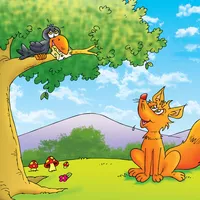The Fox and the Crow
||||la Corneille
Der Fuchs und die Krähe
The Fox and the Crow
El zorro y el cuervo
Le renard et le corbeau
La volpe e il corvo
キツネとカラス
여우와 까마귀
Lis i wrona
A Raposa e o Corvo
Лиса и ворона
Tilki ve Karga
Лисиця і ворона
狐狸和乌鸦
A Fox once saw a Crow fly off with a piece of cheese in its beak and settle on a branch of a tree.
|||||||||||||||||se poser||||||
|||||||||||||||||pousar||||||
|||||corvo||||||||||||||||||
|lis||||||||||||||dziobie||usiąść||||||
Ein Fuchs sah einmal, wie eine Krähe mit einem Stück Käse im Schnabel davonflog und sich auf einem Ast eines Baumes niederließ.
A Fox once saw a Crow fly off with a piece of cheese in its beak and settle on a branch of a tree.
Una vez, un zorro vio volar a un cuervo con un trozo de queso en el pico y posarse en la rama de un árbol.
Un jour, un renard a vu un corbeau s'envoler avec un morceau de fromage dans son bec et se poser sur une branche d'arbre.
あるキツネが、カラスがチーズのかけらをくちばしにくわえて飛び立ち、木の枝に止まるのを見たことがある。
Pewnego razu lis zobaczył wronę, która odleciała z kawałkiem sera w dziobie i usiadła na gałęzi drzewa.
Tilki bir keresinde bir Karga'nın gagasında bir parça peynirle uçtuğunu ve bir ağacın dalına konduğunu görmüş.
Một con cáo từng thấy một con quạ bay đi với một miếng phô mai trong mỏ và đậu trên cành cây.
‘That's for me, as I am a Fox,' said Master Reynard, and he walked up to the foot of the tree.
||||||||||Рейнард||||||||||
||||||||||Mistrz Lis||||||||||
|||||||||Senhor||||andou até|||||||
||||||||||Reynard||||||||||
Eso es para mí, que soy un zorro -dijo maese Reynard, y se acercó al pie del árbol.
„To dla mnie, bo jestem lisem,” powiedział Mistrz Reynard i podszedł do podstawy drzewa.
‘Đó là của ta, vì ta là cáo,' Master Reynard nói, và anh ta đi đến chân cây.
‘Good-day, Mistress Crow,' he cried.
||Pani|||
||Senhora|||
Guten Tag, Mistress Crow", rief er.
‘Good-day, Mistress Crow,' he cried.
"Buenos días, señora Crow", gritó.
„Dzień dobry, Pani Wrono,” zawołał.
‘Chào buổi sáng, bà quạ,' anh ta kêu lên.
‘How well you are looking to-day: how glossy your feathers; how bright your eye.
||ty||||||lesklé||||||
||||||||||plumes||||
||||||||błyszczące||||||
||||parece|para|hoje||brilhantes||as penas||||
Wie gut du heute aussiehst: wie glänzend dein Gefieder, wie hell dein Auge.
'Qué buen aspecto tienes hoy: qué lustrosas tus plumas; qué brillantes tus ojos.
‘Jak dobrze wyglądasz dzisiaj: jak błyszczą twoje pióra; jak jasne twoje oko.
‘Hôm nay bạn trông thật xinh đẹp: bộ lông của bạn bóng bẩy biết bao; đôi mắt của bạn thật sáng.
I feel sure your voice must surpass that of other birds, just as your figure does; let me hear but one song from you that I may greet you as the Queen of Birds.' The Crow lifted up her head and began to caw her best, but the moment she opened her mouth the piece of cheese fell to the ground, only to be snapped up by Master Fox.
||||||превосходит|||||||||||||||||||||||||||||||||||||каркать|||||||||||||||||||||||||
|||||||||||||||||||||||||||||||||||||||||||caw|||||||||||||||||||||||||
||||||supera|||||||||||||||||||||saudar|||||||||ergueu|||||começou a||cawar|||||||||||||||||||||apanhado rapidamente||||
|||||||||||||||||||||||||||||||||||||||||||quạ|||||||||||||||||||||snapped||||
|||||||||||||||||||||||||||||||||||||||||||corvo|||||||||||||||||||||||||
||||||překonat||||||||||||||||||||||||||||||||||||||||||||||||||||||||||||||
saya||yakin|suara|suara|pasti|||dari|burung lainnya|burung||seperti|anda|postur|itu|biarkan|biarkan saya|mendengar|tetapi|satu||dari|kamu|itu||agar|sambut||sebagai|||||||||||||||||||||||||||||||||||||||Raja Rubah
||||||przewyższać|||||||||||||||||||||||||||||||||||||kruk|||||||||||||||||||||snapped||||
Ich bin sicher, dass deine Stimme die der anderen Vögel übertrifft, genauso wie deine Gestalt. Lass mich nur ein Lied von dir hören, damit ich dich als Königin der Vögel begrüßen kann. Die Krähe hob den Kopf und begann zu krächzen, aber in dem Moment, in dem sie den Mund öffnete, fiel das Käsestück zu Boden und wurde von Meister Fuchs aufgeschnappt.
Estoy seguro de que tu voz supera a la de los demás pájaros, al igual que tu figura; déjame oír un solo canto tuyo para que pueda saludarte como la Reina de los Pájaros". La corneja levantó la cabeza y empezó a graznar lo mejor que podía, pero en cuanto abrió la boca, el trozo de queso cayó al suelo y fue recogido por el señorito Zorro.
Jestem pewien, że twój głos musi przewyższać głos innych ptaków, tak jak twoja sylwetka; pozwól mi usłyszeć choć jedną piosenkę od ciebie, abym mógł powitać cię jako Królową Ptaker.' Kruk uniósł głowę i zaczął krakać najlepiej, jak potrafił, ale w momencie, gdy otworzył usta, kawałek sera spadł na ziemię, tylko po to, aby został pochwycony przez Pana Lisa.
Tôi chắc chắn rằng giọng điệu của bạn phải vượt xa những con chim khác, giống như vóc dáng của bạn vậy; hãy cho tôi nghe chỉ một bài hát từ bạn để tôi có thể chào đón bạn như Nữ Hoàng của các loài chim.' Con Quạ ngẩng cao đầu và bắt đầu kêu lên hết sức mình, nhưng ngay khi nó mở miệng, miếng phô mai rơi xuống đất, chỉ để bị Master Fox cắp lấy.
‘That will do,' said he.
itu||||dia
||basta||
Eso bastará", dijo.
‘To wystarczy,' powiedział on.
‘Đủ rồi,' anh ta nói.
‘That was all I wanted.
Itu|||saya|inginkan
Das war alles, was ich wollte.
'Eso era todo lo que quería.
„To wszystko, czego chciałem.
In exchange for your cheese I will give you a piece of advice for the future .'Do not trust flatterers.'
||||||||||||||||Не|||льстецов
|||||||||||||||||||insincere praise-givers
|em troca|||||||||||conselho|||||||os bajuladores
|||||||||||||||||||Schmeichler
|||||||||||||||||||adulatori
||||||||||||rada|||||||lichváři
|||||||||||||||||||pochlebców
Als Gegenleistung für Ihren Käse gebe ich Ihnen einen Rat für die Zukunft: Trauen Sie Schmeichlern nicht.
A cambio de tu queso, te daré un consejo para el futuro: "No confíes en los aduladores".
W zamian za twój ser dam ci radę na przyszłość. 'Nie ufaj pochlebcą.'
Để đổi lấy pho mát của bạn, tôi sẽ cho bạn một lời khuyên cho tương lai. 'Đừng tin vào những kẻ nịnh hót.'

